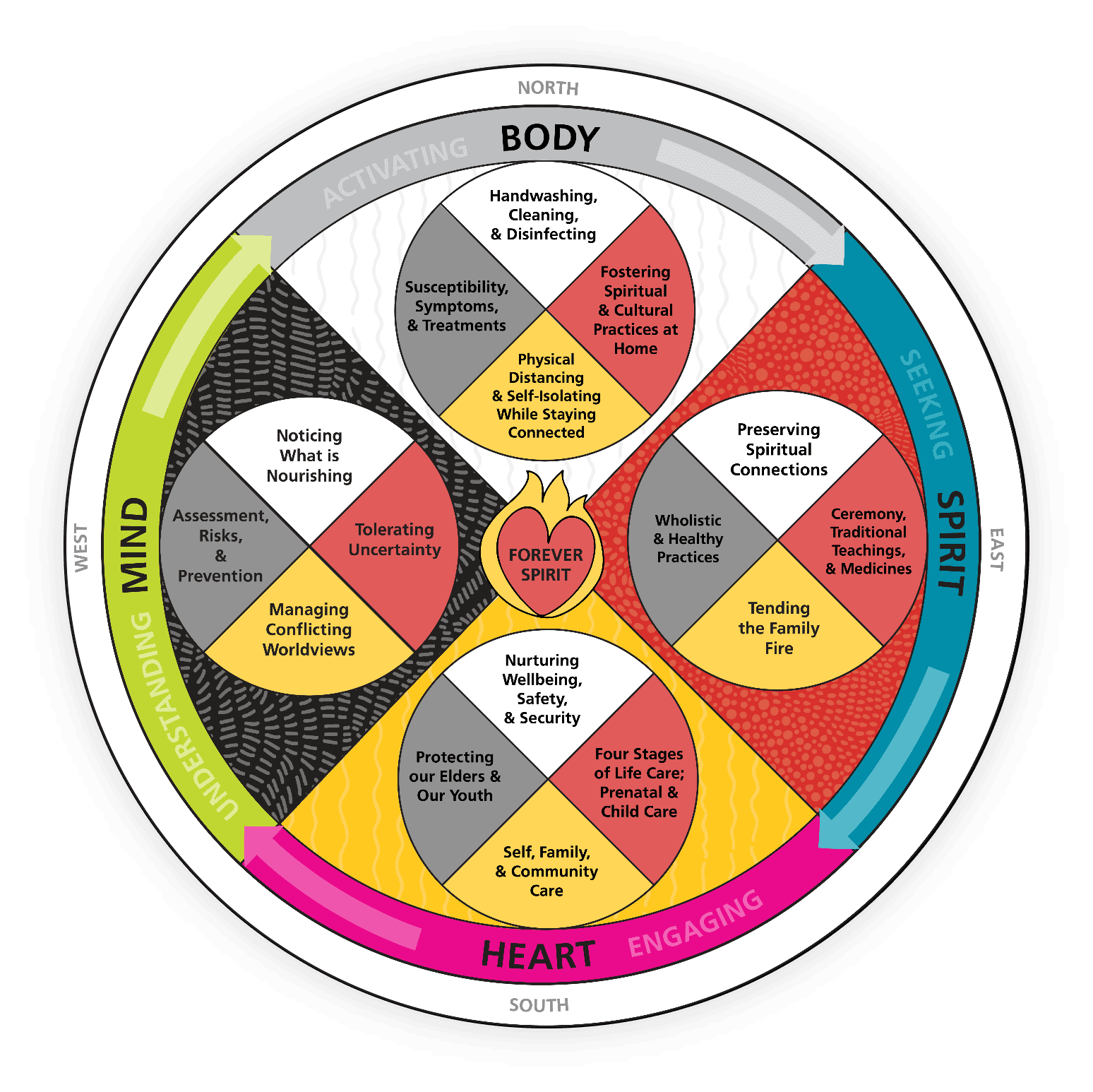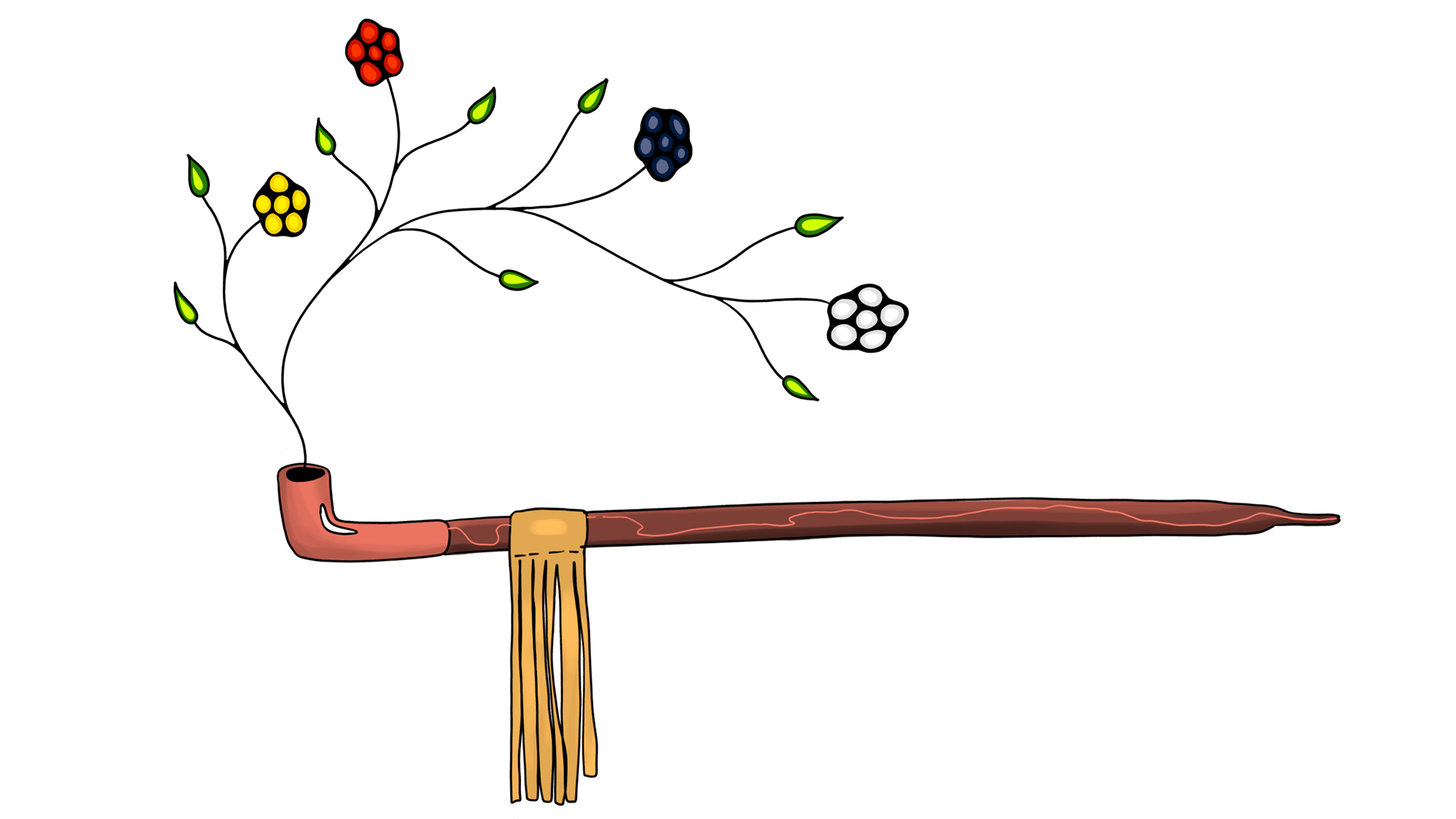Principles
We are guided by traditional Indigenous values and knowledge shared with us by the Elders on our Decision-Making Council. These values are grounded in spirit, in place and are locally-relevant. They focus on the holistic wellbeing of individuals, families and communities.
4D MODEL
Adapted from the Covid Indigenous Wellbeing Model
Text Version Of 4D Model
North: Handwashing, Cleaning and Disinfecting
Nurturing community partnerships and wellness practices. (Love)
East: Fostering Spiritual and Cultural Practices at Home
Asking for help – having a helper. (Humility)
South: Adapting to Changing Health Protocols, Staying Home When Unwell and Staying Connected
Dreaming, imagining and activating. (Bravery)
West: Susceptibility, Symptoms and Treatment
Protect and care for our most vulnerable, keep all our relations at the heart centre. (Respect)
North: Preserving Spiritual Connections
Capacity-building in relationship to Land. (Respect)
East: Ceremony, Traditional Teachings, and Medicines
4 Rs of Accountability Rooted in Relationships: Respect, Relevance, Responsibility, Reciprocity. (Humility)
South: Tending to the Family Fire
Nurturing safety through intergenerational education and collaborations. (Honour)
West: Holistic and Healthy Practices of Highlighting sophistication of Indigenous epistemology in medical education
Indigenous sciences, research practices and policy development. Stories rooted in place, land, biomedicine, ethnobotany, ethics, environment and ceremony. (Wisdom)
North: Nurturing, Wellbeing, Safety, and Security
Lighting the 8th fire and being strengths-based. (Bravery)
East: Four Stages of Life Care
Honouring life stages with compassionate care, beginning with prenatal and childcare, rooted in community values. (Love)
South: Self, Family, and Community Care
Celebrating diversity of individuals; families, communities and nations; including gender, sexuality and POC diversity, across global communities. (Bravery)
West: Protecting our Elders and Our Youth
Uplifting and facilitating knowledge translation and support opportunities for multigenerational learning. (Honour)
North: Noticing What is Nourishing
Building inclusiveness through trauma-informed care and culturally-safe spaces. (Love)
East: Tolerating Uncertainty
Understanding the social determinants of health. (Wisdom)
South: Managing Conflicting Worldviews
Advocating systemically excluded, targeted and marginalized groups. There must be truth before reconciliation. (Truth)
West: Assessment, Risks, and Prevention
Implementing Indigenous-led health promotion pathways, initiatives and approaches to clinical and virtual care programs. (Humility)

Pillar Goals
Pillar One: Indigenous Health Education and System Change
Impact
Comprehensive community-led health care strategy to improve Indigenous patient experience, promote institutional system changes and to enhance service providers’ knowledge. Adopting wise practices can advance health services, and health outcomes, for Indigenous patients in key areas.
Key Activities
- Retain Indigenous knowledge keepers (e.g. Elders) and Indigenous health educators.
- Co-create vision and blueprint for the Centre for Wise Practices by engaging Indigenous stakeholders (i.e. community engagement).
- Explore and build partnerships to strengthen Indigenous health across Ontario.
- Implement mandatory cultural safety training for all WCH staff on how to deliver culturally appropriate care to Indigenous patients and visitors to WCH.
- Invest in community-driven vision for an inclusive space (e.g. smudging, sweat lodge, medicine garden, etc.).
- Implementation of culturally safe practices.
Pillar Two: Indigenous Knowledge Translation and Health Equity Research
Impact
Research, education and clinical care that acknowledges and respects Indigenous knowledges and upholds the principles and standards of Indigenous knowledge translation. Initiatives that harmonize Indigenous, traditional and western knowledge systems.
Key Activities
- Develop WCH research policies and guidelines that adhere to the 4 key Indigenous Knowledge translation research principles of respect, reciprocity, relevance and responsibility, while upholding the Ownership, Control, Access and Possession principles (OCAP™).
- Invest in capacity-building to create a partnership plan with the Toronto Academic Health Sciences Network to spread and scale best (wise) practices in health care delivery for Indigenous patients and families.
- Increase research and mentorship opportunities for Indigenous students and health service providers to support the next generation of Indigenous leadership.
- Support and invest in Indigenous community driven participatory research and health equity projects.
Pillar Three: Public Health Policy and Advocacy
Impact
Continuous advocacy and policy advancement to create optimal conditions that advance health equity for Indigenous individuals, families and communities.
Key Activities
- Invest in health promotion programs specifically targeting health for Indigenous women.
- Promote public education and awareness.
- Contribute to policy discussions on the social determinants of health and other factors influencing health equity.
- Indigenous leadership development and capacity-building for WCH to become a chosen Indigenous health partner.
- Relationship-building with all levels of government.
- Engage in national efforts to advance health outcomes for Indigenous communities.
